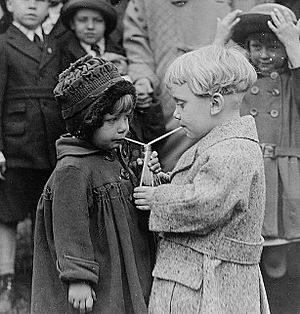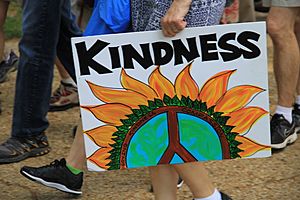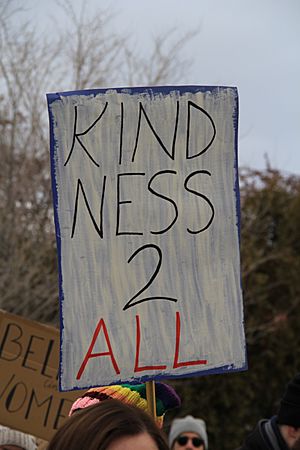Kindness facts for kids
Kindness is when you are generous, thoughtful, and helpful to others. You do these good things without expecting anything back, like praise or a reward. It's about caring for people and showing them you care.
Many important thinkers, religions, and scientists have studied kindness. For example, the ancient Greek thinker Aristotle said kindness is helping someone who needs it, not for your own gain, but for their benefit. Another thinker, Friedrich Nietzsche, believed kindness and love were the best ways to heal problems between people. Kindness is also seen as one of the Knightly Virtues, which are important qualities for knights.
Contents
History of Kindness
The word kindness has been used in English since around the 1300s. Over time, its meaning became what we understand today.
Kindness has always been a part of human cultures. It's seen as a personality trait, meaning it's a part of who someone is. It also connects to the idea of hospitality, which is being welcoming and generous to guests.
Kindness in Society
When people choose a partner, studies show that both men and women look for kindness. It's considered important, along with things like being smart, how someone looks, and their age.
Kindness and Your Mind
Scientists at Yale University did studies with babies. They found that kindness might be something humans are born with. Other studies show that babies start to feel empathy (understanding what others feel) very early on. This can lead to children showing concern for their friends when they are sad or hurt.
Some experts, like Barbara Taylor and Adam Phillips, say that true kindness can change people. It can affect them in ways you might not expect.
Being kind can also make you feel better! Many studies have tried to see if doing kind things improves a person's happiness. A review of 27 studies found that doing small acts of kindness can indeed make you feel happier and improve your well-being.
Kindness as a "Weapon"
Some thinkers have suggested that kindness can be used in a surprising way: to make enemies think differently.
The ancient Book of Proverbs says:
- If your enemy is hungry, give them food. If they are thirsty, give them water. By doing this, you will make them feel ashamed.
The writer Leo Tolstoy also said:
- You should respond with kindness when someone does something bad to you. This will take away the pleasure they get from being mean.
Kindness in Stories and Books
- The Tirukkural is an old Indian book about good behavior. It has a whole chapter about kindness. It also talks about related ideas like being welcoming, speaking nicely, having compassion, and being non-violent.
- Mark Twain once said that "Kindness is a language which the deaf can hear and the blind can see." This means kindness is understood by everyone, no matter what.
- Many people believe that most of Shakespeare's plays are about human kindness.
- Robert Louis Stevenson thought that kindness is the most important part of love. He even called love "passionate kindness."
- In the Bible, the Christian apostle Paul lists kindness as one of the "fruit of the Spirit" – good qualities that come from a good spirit. He also wrote, "Love is patient, love is kind."
Kindness in Movies and Music
The movie Pay it Forward is a great example of how kindness can spread. It's based on a book by Catherine Ryan Hyde. In the story, a teacher challenges his students to "change the world." One student, Trevor, starts by doing kind things for strangers. These acts create a chain reaction of kindness that goes far beyond what he imagined. The idea of "Pay It Forward" is that if we do kind things for others, it helps create a more caring society.
In 2011, a group called Life Vest Inside made a video called "Kindness Boomerang." It shows how one kind act can pass from person to person and then come back to the person who started it. The video's creator, Orly Wahba, said each scene was based on real kind moments she experienced. The video became very popular and was seen by over 20 million people.
The singer Harry Styles has been promoting kindness since 2017 with his slogan 'Treat People with Kindness', often shortened to 'TPWK'.
Learning to Be Kind
Children usually learn kindness from their parents. They learn by watching and by being taught directly. Studies show that kindness can be taught and encouraged, especially during the first 20 years of life.
Other studies have found that learning to be kind can improve your happiness, similar to how learning to be grateful does. Even adults in college can improve their well-being by learning about kindness. Many religions also teach their followers to be kind, and people who are religious often report being happier and living longer.
See also
 In Spanish: Amabilidad para niños
In Spanish: Amabilidad para niños
- Altruism
- Compassion
- Empathy
- Generosity
- Good
- Good faith
- Kindness Day UK
- Pay it forward
- Random act of kindness
- Random Acts of Kindness Day
- Moral character
- Moral emotions
- Reciprocity
- r/K selection theory
- The Kindness Offensive
- World Kindness Day
 | James Van Der Zee |
 | Alma Thomas |
 | Ellis Wilson |
 | Margaret Taylor-Burroughs |




